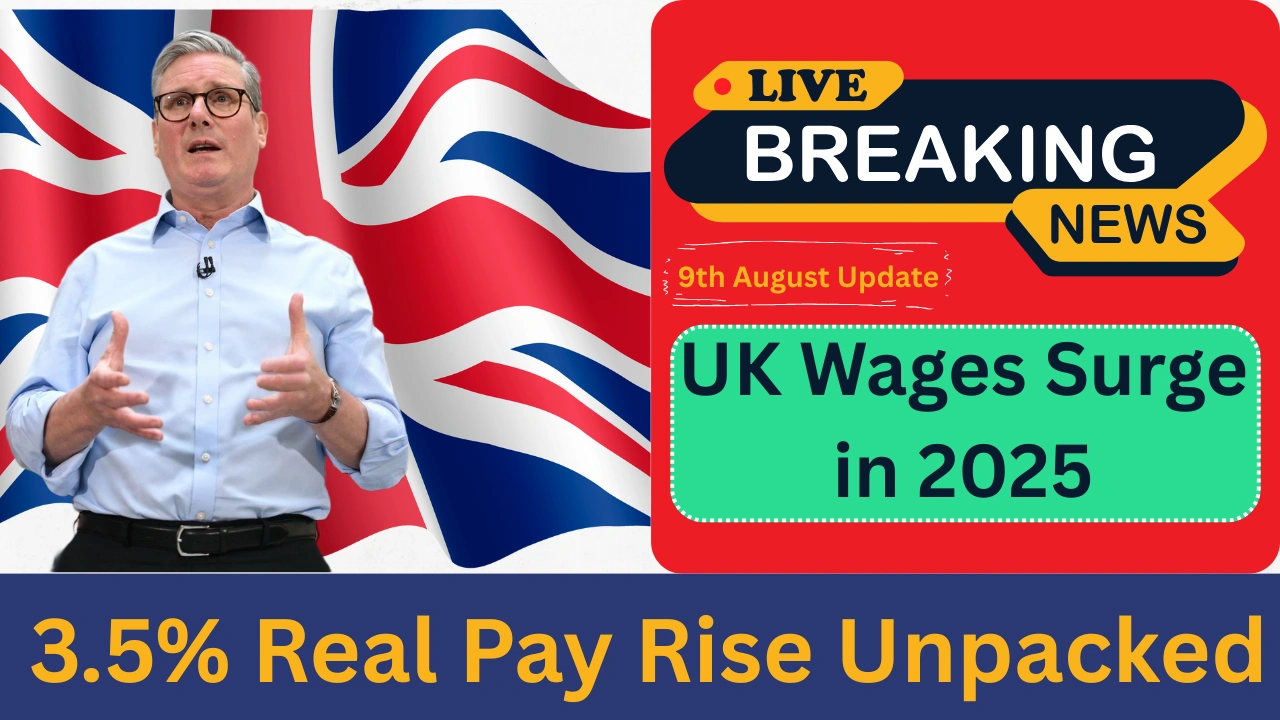The year 2025 is shaping up to be a milestone year for workers across the UK as real wage growth hits 3.5%. This growth is the result of a combination of government policies, economic recovery, and sector-specific improvements that have finally started to translate into tangible financial gains for workers. With inflation showing signs of slowing down and wage growth outpacing it, many are starting to feel the relief that has been much needed after a long period of financial uncertainty. But the question is: how does this affect you, and will you benefit from these pay rises?
Understanding Real Wage Growth
Real wage growth refers to the increase in wages after adjusting for inflation. Essentially, it’s the growth in your purchasing power. If your salary increases by 3.5%, but inflation is also at 3%, the real wage growth is just 0.5%. However, this time, the 3.5% growth is significantly higher than inflation rates, meaning that UK workers, on average, are now able to buy more goods and services than before.
Impact on Different Sectors
This positive wage trend is not universal across all industries, but it does show promise. For example, sectors like healthcare, IT, and engineering have seen some of the highest increases in wages due to ongoing skill shortages. Cities like London, Manchester, and Birmingham are expected to see some of the most significant improvements due to their higher living costs, which have traditionally outpaced wage growth.
In London, public sector workers are benefiting from higher-than-average increases due to new government funding aimed at addressing longstanding pay disparities. Similarly, Birmingham and Glasgow have seen tech and digital marketing salaries rise as demand for these skills continues to grow. Even in more traditional sectors like construction, there has been a marked improvement as demand for skilled labor in urban regeneration projects remains high.
Also Read: Housing Benefit for Eligible People & Check If You Are Eligible – New DWP Rules Explained
Regional Differences in Pay Rise
While the national average wage growth stands at 3.5%, the impact can vary greatly depending on where you live. Major metropolitan areas, such as London and Manchester, tend to see higher wages due to increased living costs. Workers in these areas may experience even more significant gains as employers attempt to compensate for higher housing and transportation costs.
However, the story is a little different in rural areas and smaller cities. While pay rises are still evident, they may not be as pronounced. Workers in areas like Norwich or Stoke-on-Trent might see more modest gains, but these can still provide a welcome boost for those who have struggled with stagnant wages for years.
The Role of the Government
The UK government has played a key role in pushing this wage growth by instituting a National Living Wage increase and increasing public sector salaries. There have also been incentives for businesses to invest in their employees, such as tax relief for companies offering training programs. The government’s role in this wage growth cannot be understated, especially when it comes to ensuring that workers in lower-paying industries also benefit.
For example, the NHS has seen significant increases in pay for nurses and medical professionals, which should help ease the staffing shortages faced by hospitals. Similarly, teachers have received well-deserved pay hikes, as have other public sector employees who had seen their wages stagnate for years.
Will You Benefit from the UK Pay Rise?
If you’re wondering whether you will benefit from this pay rise, it depends on your profession and location. If you work in a high-demand field like technology or healthcare, you’re likely to see a more substantial wage increase. On the other hand, if you’re in a lower-demand sector, your increase might be closer to the national average.
One thing is clear: this real wage growth represents a positive shift for workers, especially those who have struggled with the rising cost of living. The growth is expected to continue over the next few years as businesses adjust to the current economic environment and inflation continues to ease.
Trending FAQs About UK Pay Rise 2025
-
What sectors will see the biggest pay rises in 2025?
Sectors like healthcare, IT, engineering, and digital marketing are seeing the biggest increases due to skill shortages and growing demand. -
How much more will workers in London earn compared to other cities?
Workers in London can expect higher pay rises, but this is also reflective of the higher living costs in the capital. -
Will the UK government continue to raise wages in future years?
Given the current trend and ongoing financial support, the government is likely to continue raising wages, especially in the public sector. -
How does real wage growth impact workers in rural areas?
While rural areas may see slower wage growth, any increase in salary is beneficial for workers who have faced higher-than-average living costs for years. -
When can we expect the next wage rise in the UK?
Future pay rises are expected to be linked to the UK’s economic recovery and inflation rates, with some increases anticipated in 2026.
Bottom Line:
As we move through 2025, real wage growth hitting 3.5% is a promising sign for many UK workers. Whether in London, Manchester, or more rural regions, the key is knowing how these changes impact your personal financial situation. Keep an eye on sector trends, and you may see your earnings grow in the years ahead.
